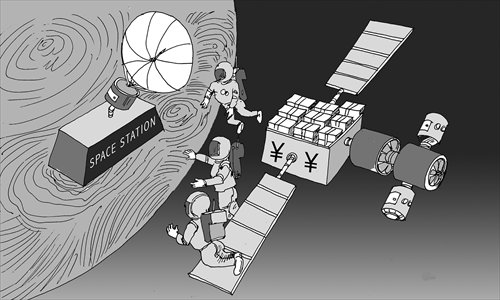China and US should work together on space travel
By Chris Dalby Source:Global Times Published: 2015-12-20 20:38:01

Illustration: Luo Xuan/GT
A famous, if slightly warped, statistic states that for every dollar the US spends in outer space, it gains eight dollars in economic growth. The long-term American dominance of space may have made that true but it now has severe competition. China's space goals are beginning to look similar to NASA's.
No longer is it satisfied with sending up satellites or manned Shenzhou missions. The country is now planning a permanent space station by 2020 accompanied by manned missions to the Moon and Mars. But what will China get from it? Prestige? Acclaim? Those things might have been enough in the past but, especially with a slowing economy, the conquest of space needs to turn a profit.
At 10 percent growth a year, China's space program is getting pricey. However, there are numerous avenues to make it affordable. China already lets foreign satellites piggy back off its rockets, space tourism is now being discussed, and in the long-term, China may even take the lead in asteroid mining.
Seeking to analyze or understand China's space program on the basis of its price tag alone is an exercise in futility. Unlike NASA, which has seen its shuttles grounded and its budgets restricted for years, China may not value each space venture on its own cost but as part of a larger order. Furthermore, as China's own GDP has grown steadily, so has its space budget.
In pure dollar terms, China is still only spending about $2 billion a year on its space program as opposed to NASA's $18 billion. However, that $2 billion is going toward supporting numerous pillars. The Jade Rabbit rover, which landed on the Moon in 2013, showed China's focus on our satellite. Construction of the Tiangong 2 space lab was delayed but it is now set to launch in 2016, giving China a permanent foothold in space. It should be completed around 2022, near when the International Space Station will be retired.
But how quickly will tangible benefits warrant China's investments? After all, while space travel generated unparalleled public enthusiasm in the US, NASA's budget was slashed after the collapse of the USSR. Without the rivalry of the Cold War, the US' interest in being the leader of space exploration waned. The geo-political climate of today means that China is unlikely to run into similar problems. Tangible benefits cannot be easily quantified economically, but seeing people, whether Chinese or American, walk on the Moon once more will work toward a tangible purpose: the joint exploration of space.
While Russia and the US have worked together consistently on the International Space Station (ISS), China has not been invited to take part, at the insistence of Congress. While concerns about intellectual property and national security may have some basis, this is nothing more than a colossal wasted opportunity. Treaties exist to prevent the militarization or colonization of outer space and surely the best way to enforce them is to ensure all space players work toward the same goals. China is focused on lunar exploration while the US seems bent on getting to Mars. The private space sector is blooming in the US with Space X and Blue Origin making great strides and now refueling the ISS. Private launch pads being built will hopefully lighten the load born by the Baikonur Cosmodrome in Kazakhstan.
Competition drives success and innovation but another space race between China and the US is not what the world needs. Arranging such long-term collaboration would require the setting aside of old grievances but doing so could lead to a currently unthinkable objective: a Space X rocket, carrying a crew of Russians and American astronauts to the Tiangong 2 Space Lab.
This also makes solid business sense. The desire to fund space exploration waxes and wanes as governments change. A true international cooperation, bringing together the US and Europe with emerging players such as China and India, would see the expense of space travel shared by all, as well as the costs of manpower, equipment and payloads.
In Ridley Scott's film, The Martian, the American and Chinese space agencies team up to rescue an astronaut trapped on the red planet. For the sake of discovery, such collaboration should rapidly move beyond the realm of science fiction.
The author is a Mexico-based analyst of Chinese politics and economics. bizopinion@globaltimes.com.cn
Posted in: Air & Space, Columnists